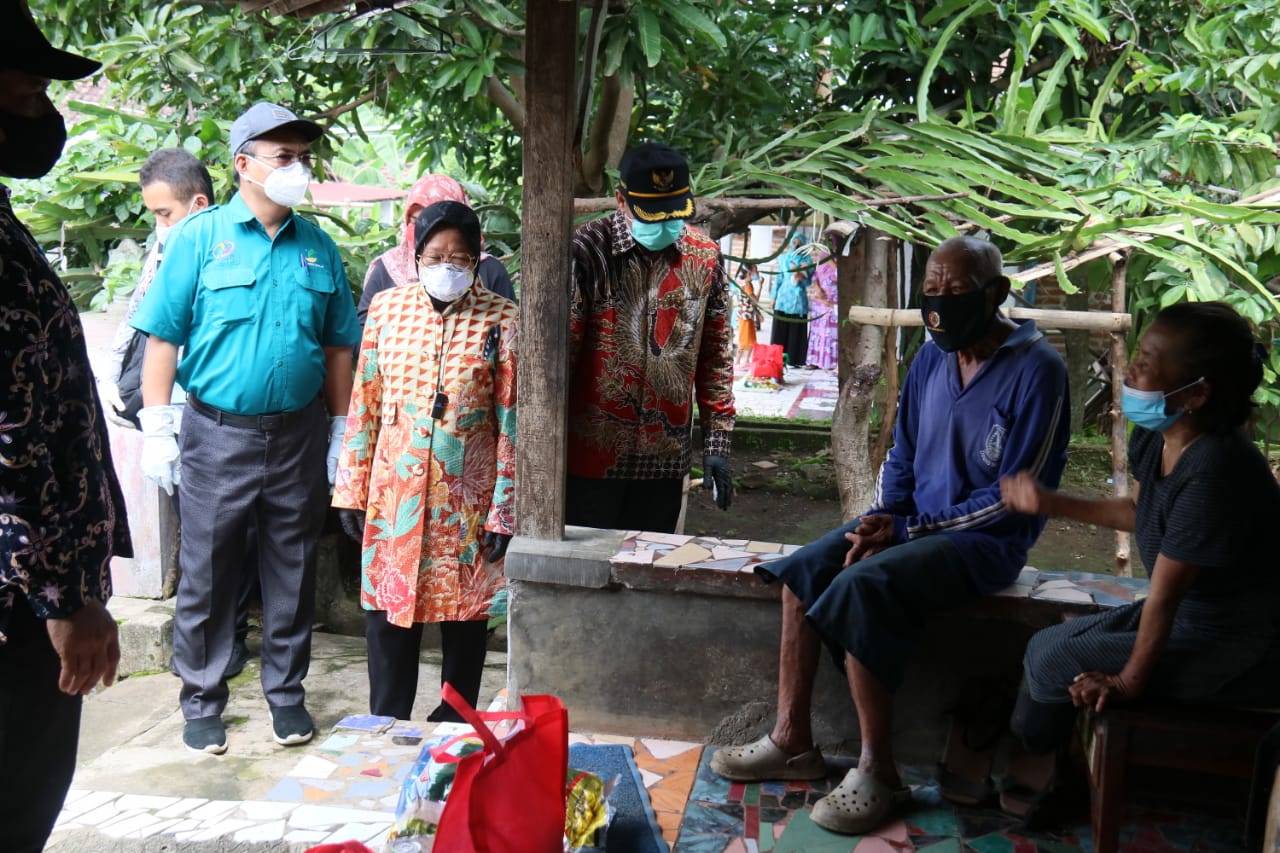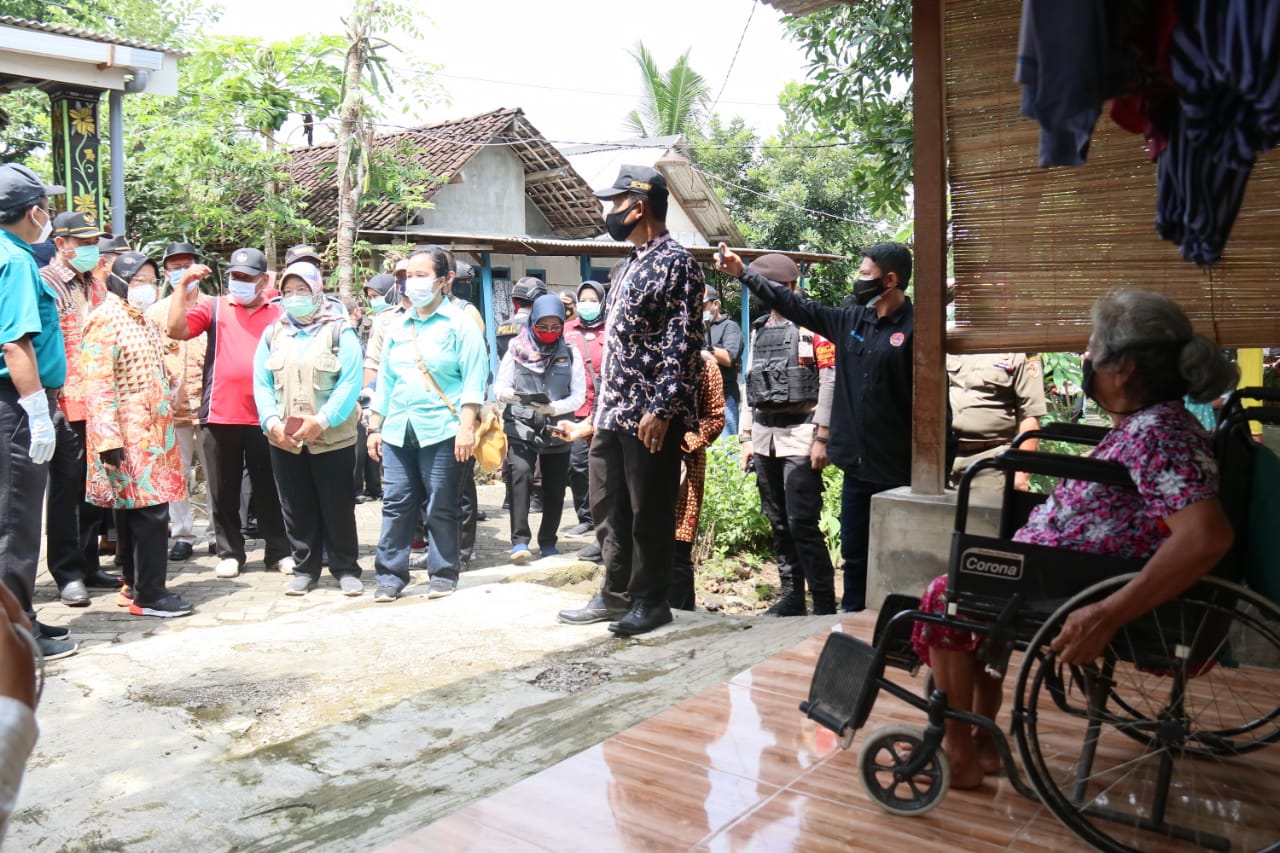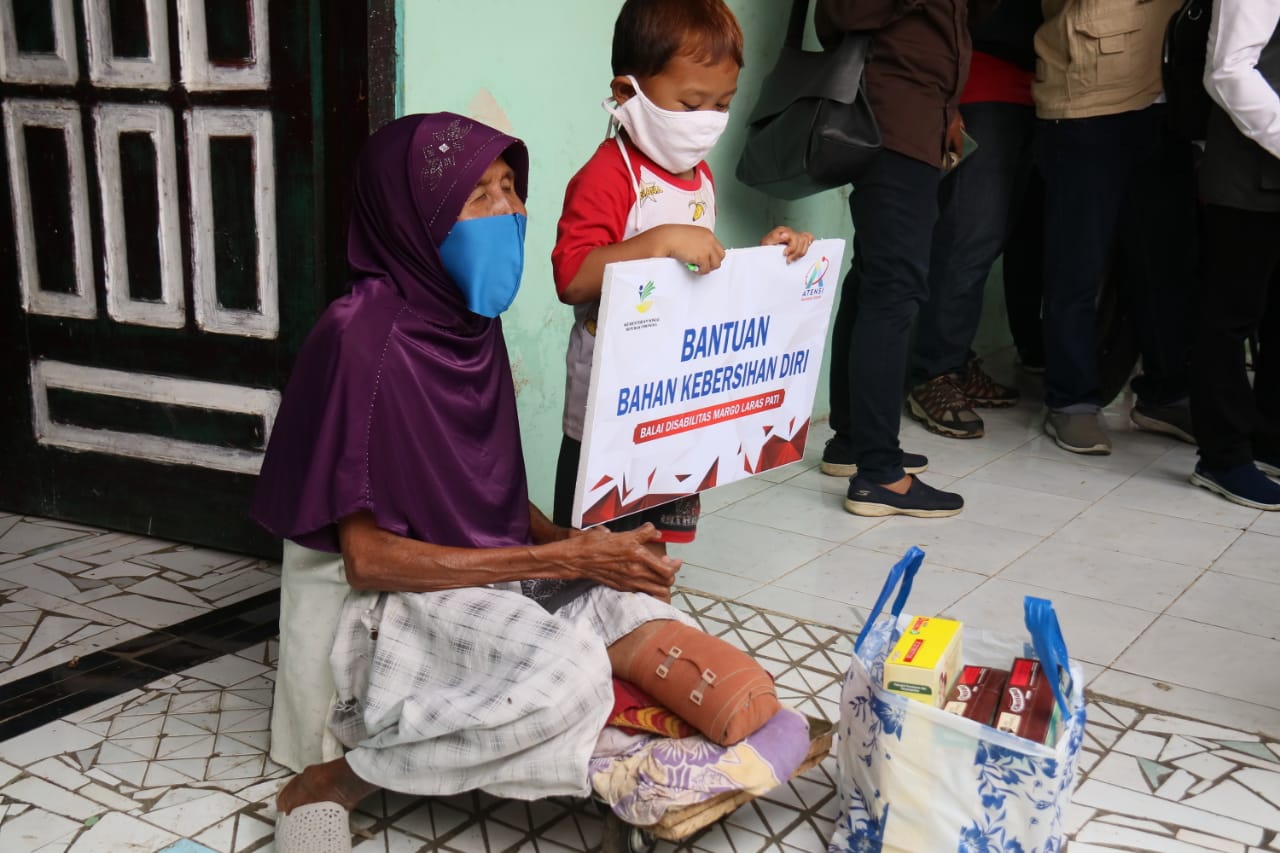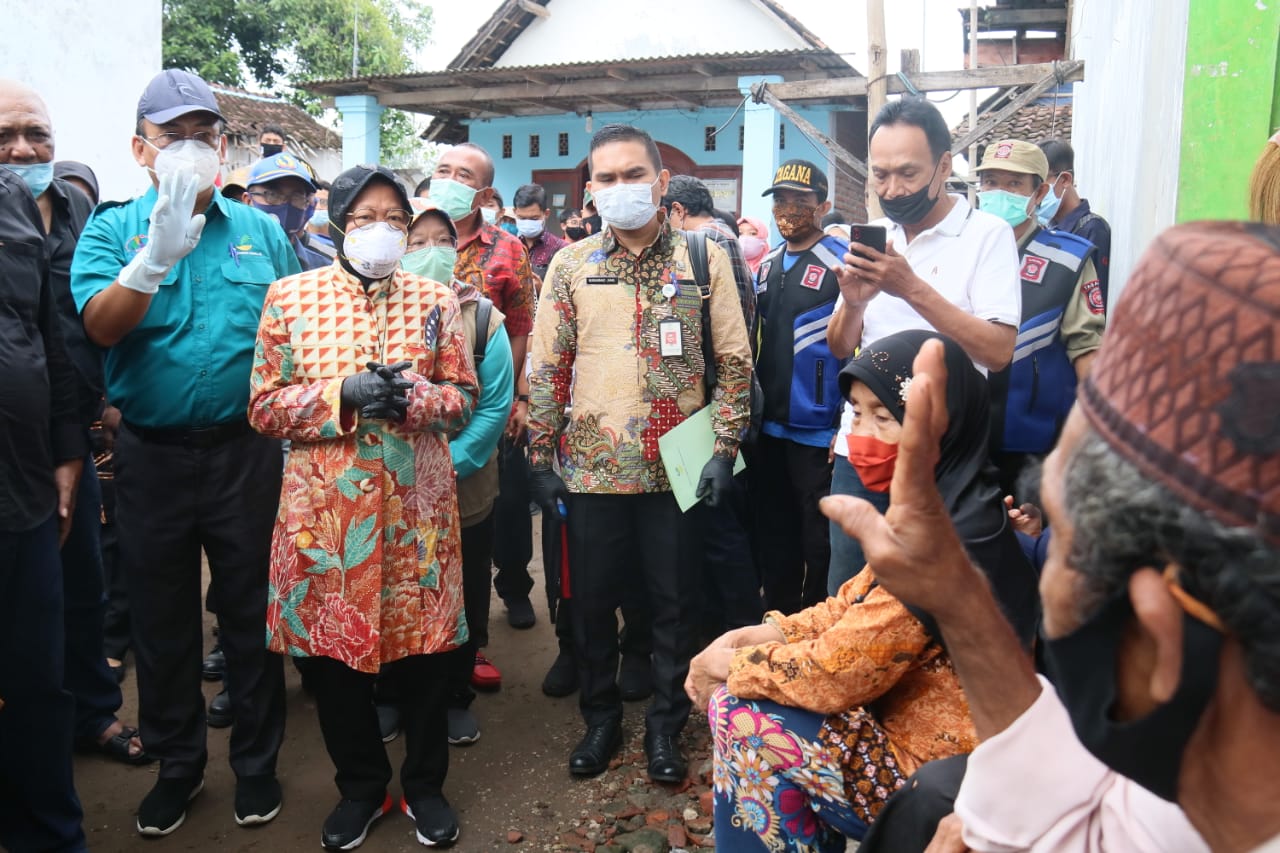MOJOKERTO (January 2, 2021) - The ex-localization area of Balong Cangkring, Pulorejo Village, Prajurit Kulon District, Mojokerto City looks quiet.
Since the localization officially closed on May 29, 2016, this area is no longer crowded with men looking for fun. Even the residents of the guesthouse in this area have returned to their respective hometowns. The area is fulfilled only by local residents.
This condition makes the natives of the area lose their livelihood. Many of them earn a fortune by begging, or pulling a rickshaw.
The Balong Cangkring area is a former localization where the Mojopahit Foundation fosters various socially disabled residents. Unfortunately, many children who live in the former Balong Cangkring drop out of school and even choose to live on the street.
This condition certainly makes a number of parties concerned, including the Minister of Social Affairs, Tri Rismaharini.
A few days after being sworn in, Risma immediately visited several areas in East Java to distribute assistance to vulnerable residents in the former Balong Cangkring localization and ex-leprosy residents in Sumber Glagah, Mojokerto Regency, Saturday (2/1).
When visiting the former Balong Cangkring localization, Risma admitted that she was touched by the fate of the majority of children who did not go to school. She even gave the typical advice of a mother to her children.
"Problems are always there, but let's face it together, dear. I will help, it's not easy but there's nothing difficult if we really do it. Let's prove that all of you are children that parents and the environment can be proud of . No need to be ashamed of your status. God saw your struggle, not your identity. Don't run away," said Risma in front of the children assisted by the Majapahit Foundation.
One of the successful street children named Bledhek. Three years ago, Bledhek, whose whole body was covered in tattoos, complied with Risma's invitation to repent and continue his education.
"Bledhek is serious about changing his life, he continues to study and even achieves achievements in the field of martial arts. Now Bledhek is studying in his 4th semester at Unisa. In the past, you could say that Bledhek was really naughty, he had done all kinds of mischief such as stealing and others," said Risma. during a working visit accompanied by the Director General of Social Rehabilitation Harry Hikmat.
By telephone, Bledhek also admitted that his life is now more focused. He is now pursuing martial arts sports ranging from wushu to silat.
Since the localization officially closed on May 29, 2016, this area is no longer crowded with men looking for fun. Even the residents of the guesthouse in this area have returned to their respective hometowns. The area is fulfilled only by local residents.
This condition makes the natives of the area lose their livelihood. Many of them earn a fortune by begging, or pulling a rickshaw.
The Balong Cangkring area is a former localization where the Mojopahit Foundation fosters various socially disabled residents. Unfortunately, many children who live in the former Balong Cangkring drop out of school and even choose to live on the street.
This condition certainly makes a number of parties concerned, including the Minister of Social Affairs, Tri Rismaharini.
A few days after being sworn in, Risma immediately visited several areas in East Java to distribute assistance to vulnerable residents in the former Balong Cangkring localization and ex-leprosy residents in Sumber Glagah, Mojokerto Regency, Saturday (2/1).
When visiting the former Balong Cangkring localization, Risma admitted that she was touched by the fate of the majority of children who did not go to school. She even gave the typical advice of a mother to her children.
"Problems are always there, but let's face it together, dear. I will help, it's not easy but there's nothing difficult if we really do it. Let's prove that all of you are children that parents and the environment can be proud of . No need to be ashamed of your status. God saw your struggle, not your identity. Don't run away," said Risma in front of the children assisted by the Majapahit Foundation.
One of the successful street children named Bledhek. Three years ago, Bledhek, whose whole body was covered in tattoos, complied with Risma's invitation to repent and continue his education.
"Bledhek is serious about changing his life, he continues to study and even achieves achievements in the field of martial arts. Now Bledhek is studying in his 4th semester at Unisa. In the past, you could say that Bledhek was really naughty, he had done all kinds of mischief such as stealing and others," said Risma. during a working visit accompanied by the Director General of Social Rehabilitation Harry Hikmat.
By telephone, Bledhek also admitted that his life is now more focused. He is now pursuing martial arts sports ranging from wushu to silat.
Bledhek was also elected as a member of Paskibra and raised the flag during the Independence Day Ceremony at the Surabaya City Government.
"God is all-hearing, if you really want to change, there must be a way. It's hard but it's not impossible. I advised you not to try drugs because later you will regret it," Risma encouraged.
At the location, Risma did blusukan (hands-on operation), visited the residences of the elderly, pedicab drivers, beggars and street children. The majority of them do not have a place to live so now they live in the house of the Mojopahit Foundation.
"I'm trying to map out what I can do for the community, what they need for their welfare. After that, a solution will be found," she said.
According to Risma, each region has different problems and different handling.
From the results of this blusukan, it will be used as a reference for the distribution of assistance from the Ministry of Social Affairs' budget.
"We hope that we can systematically assist them so that problems like this can be resolved, including the provided assistance," he explained.
Risma responded that the condition of the Mojopahit Foundation building was concerning that many were damaged and unfit for habitation. Risma will communicate with related parties to find a solution because the buildings are not owned by individuals but from the Mojopahit Foundation.
"God is all-hearing, if you really want to change, there must be a way. It's hard but it's not impossible. I advised you not to try drugs because later you will regret it," Risma encouraged.
At the location, Risma did blusukan (hands-on operation), visited the residences of the elderly, pedicab drivers, beggars and street children. The majority of them do not have a place to live so now they live in the house of the Mojopahit Foundation.
"I'm trying to map out what I can do for the community, what they need for their welfare. After that, a solution will be found," she said.
According to Risma, each region has different problems and different handling.
From the results of this blusukan, it will be used as a reference for the distribution of assistance from the Ministry of Social Affairs' budget.
"We hope that we can systematically assist them so that problems like this can be resolved, including the provided assistance," he explained.
Risma responded that the condition of the Mojopahit Foundation building was concerning that many were damaged and unfit for habitation. Risma will communicate with related parties to find a solution because the buildings are not owned by individuals but from the Mojopahit Foundation.
"We will communicate with the foundation because the land is not owned by individuals, but belongs to the foundation," he said.
Ex-leprosy Patients also Want to be Empowered
Risma then continued her visit to Sumber Glagah Hamlet, Tanjung Kenongo Village, Pacet District, Mojokerto Regency.
This hamlet is occupied by former leprosy sufferers from various regions after receiving treatment at the Sumber Glagah Leprosy Hospital.
The Minister of Social Affairs, who is also the former mayor of Surabaya, visited Sumber Glagah Hamlet due to the increasing number of former sufferers living in the area as they breed and keep residing in Sumber Glagah Hamlet.
"If ladies and gentleman have recovered, it's better to be independent and get out of here so that you are not burdened. The Sumber Glagah Hamlet area is for the sick, as a shelter after being treated at the hospital. If the sick stay outside, people are worried that they won't accept it. On the other hand, the community can understand each other well here," said Risma when interacting with the residents of Sumber Glagah Hamlet.
From various sources, it is known that since 1982, this area has been inhabited by ex-leprosy patient which is a program of the Social Office of East Java Province. As many as 50 families (KK) ex-leprosy were moved from Surabaya.
Then in 1987 another 25 referral families from the Social Office of Mojokerto Regency were added. Currently, there are 199 families and approximately 25% of that number are still suffering from leprosy.
The residenst with ex-leprosy inhabits an area of approximately 8 hectares. In that place, the Leprosy Hospital was built which has now been turned into a Type C General Hospital.
All residents have been recorded in the Social Welfare Integrated Data (DTKS) belonging to the Ministry of Social Affairs in order to receive assistance from various programs at the Ministry of Social Affairs.
Ex-leprosy Patients also Want to be Empowered
Risma then continued her visit to Sumber Glagah Hamlet, Tanjung Kenongo Village, Pacet District, Mojokerto Regency.
This hamlet is occupied by former leprosy sufferers from various regions after receiving treatment at the Sumber Glagah Leprosy Hospital.
The Minister of Social Affairs, who is also the former mayor of Surabaya, visited Sumber Glagah Hamlet due to the increasing number of former sufferers living in the area as they breed and keep residing in Sumber Glagah Hamlet.
"If ladies and gentleman have recovered, it's better to be independent and get out of here so that you are not burdened. The Sumber Glagah Hamlet area is for the sick, as a shelter after being treated at the hospital. If the sick stay outside, people are worried that they won't accept it. On the other hand, the community can understand each other well here," said Risma when interacting with the residents of Sumber Glagah Hamlet.
From various sources, it is known that since 1982, this area has been inhabited by ex-leprosy patient which is a program of the Social Office of East Java Province. As many as 50 families (KK) ex-leprosy were moved from Surabaya.
Then in 1987 another 25 referral families from the Social Office of Mojokerto Regency were added. Currently, there are 199 families and approximately 25% of that number are still suffering from leprosy.
The residenst with ex-leprosy inhabits an area of approximately 8 hectares. In that place, the Leprosy Hospital was built which has now been turned into a Type C General Hospital.
All residents have been recorded in the Social Welfare Integrated Data (DTKS) belonging to the Ministry of Social Affairs in order to receive assistance from various programs at the Ministry of Social Affairs.
However, not all residents receive the Healthy Indonesia Card (KIS), so that health services that should be carried out routinely are hampered or must be paid independently.
The Ministry of Social Affairs also recorded the need for assistive devices such as prosthetic limbs and wheelchairs for people with leprosy. This matter was immediately handled when there were residents who complained that the size of their prosthetic legs was no longer enough.
Every KK, once a year, receives basic food assistance in the form of 25 kg of rice, 2 kg of sugar, 2 liters of cooking oil, tea, sardines and so on from the Social Office.
However, they are still not free from stigma. This makes it difficult for them to interact with the wider community.
They also expect an empowerment program in the form of skills training that is not related to food, such as workshops, carpentry and so on.
Risma also plans to open a business for residents of former leprosy patients. These businesses include chicken and catfish.
In the two locations visited, Risma provided assistance to the Social Rehabilitation Assistance Program (ATENSI) in the form of Personal Protective Equipment consisting of supplements, honey, hand sanitizers, masks and liquid soap.
Then basic food assistance, namely rice, instant noodles and sardines, educational aids, nutritional supplements for children such as milk, cereal, vitamins, honey and biscuits, assistance for self-reliance businesses and the establishment of caring shelter workshops.
This assistance is a collaboration of the Technical Directorate and the Technical Implementation Unit (UPT) under the Directorate General of Social Rehabilitation, namely the Directorate of Social Rehabilitation for Victims of Drug Abuse, the Directorate of Social Rehabilitation for the Elderly, "Pangudi Luhur" Training Center in Bekasi, "Margo Laras" Center for Disability Center in Pati, "Kartini" Disability Center in Temanggung, "Satria" Resident Center in Baturraden and "Antasena" Children's Center in Magelang.
The Ministry of Social Affairs also recorded the need for assistive devices such as prosthetic limbs and wheelchairs for people with leprosy. This matter was immediately handled when there were residents who complained that the size of their prosthetic legs was no longer enough.
Every KK, once a year, receives basic food assistance in the form of 25 kg of rice, 2 kg of sugar, 2 liters of cooking oil, tea, sardines and so on from the Social Office.
However, they are still not free from stigma. This makes it difficult for them to interact with the wider community.
They also expect an empowerment program in the form of skills training that is not related to food, such as workshops, carpentry and so on.
Risma also plans to open a business for residents of former leprosy patients. These businesses include chicken and catfish.
In the two locations visited, Risma provided assistance to the Social Rehabilitation Assistance Program (ATENSI) in the form of Personal Protective Equipment consisting of supplements, honey, hand sanitizers, masks and liquid soap.
Then basic food assistance, namely rice, instant noodles and sardines, educational aids, nutritional supplements for children such as milk, cereal, vitamins, honey and biscuits, assistance for self-reliance businesses and the establishment of caring shelter workshops.
This assistance is a collaboration of the Technical Directorate and the Technical Implementation Unit (UPT) under the Directorate General of Social Rehabilitation, namely the Directorate of Social Rehabilitation for Victims of Drug Abuse, the Directorate of Social Rehabilitation for the Elderly, "Pangudi Luhur" Training Center in Bekasi, "Margo Laras" Center for Disability Center in Pati, "Kartini" Disability Center in Temanggung, "Satria" Resident Center in Baturraden and "Antasena" Children's Center in Magelang.
 Bahasa
Bahasa
 English
English





